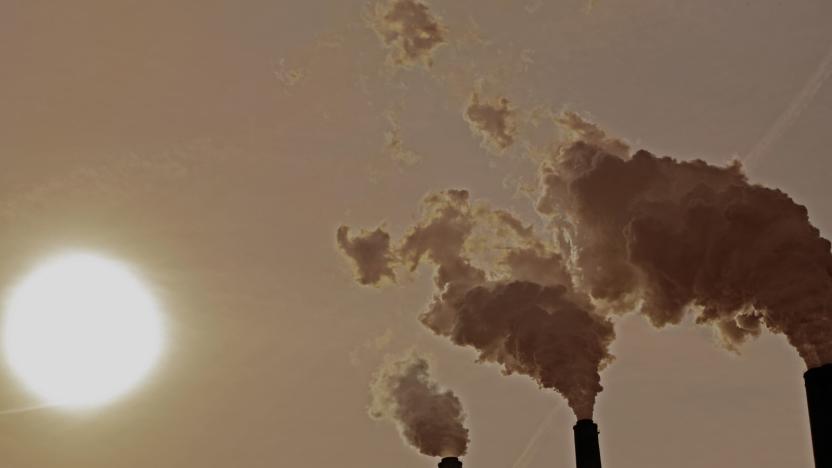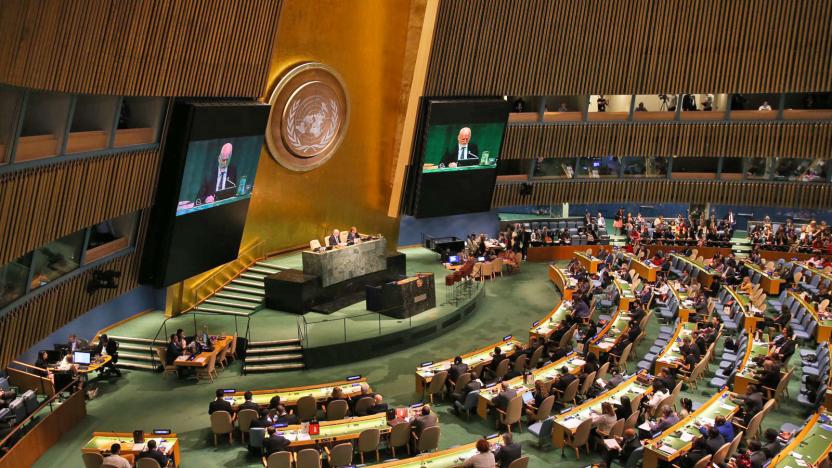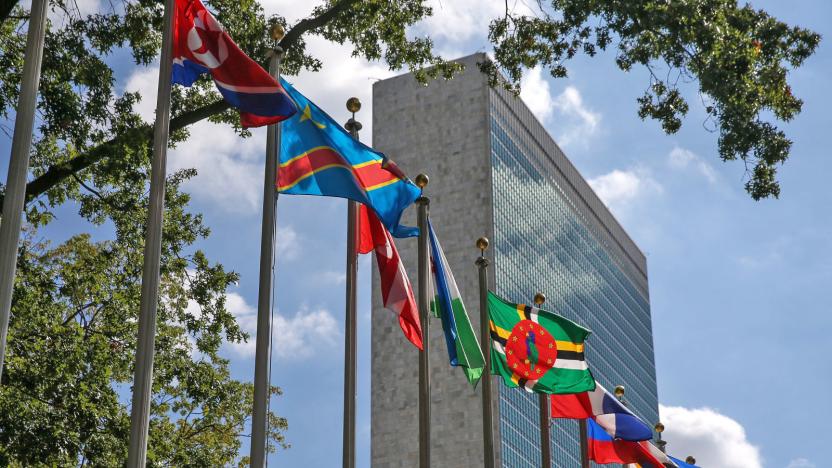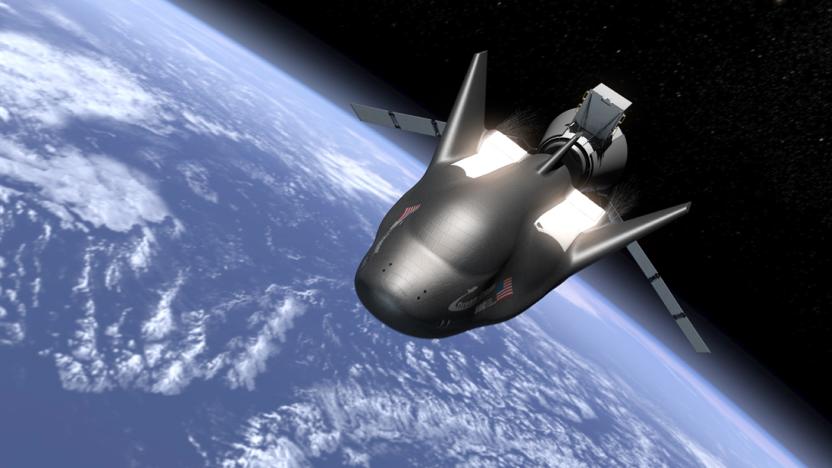un
Latest

Treaty ending use of planet-warming HFCs takes effect in 2019
The treaty phasing out the use of Earth-warming hydrofluorocarbons now has an official start date. Sweden has become the 20th country to ratify the Kigali Amendment, invoking a clause that has the measure taking effect on January 1st, 2019. From then on, wealthier countries (less fortunate nations have until 2024 or 2028) must cut back on use of the greenhouse gas in everything from air conditioning to refrigerators. Ideally, this pushes companies to use and develop eco-friendly coolants.

Scientists can't explain a 'worrying' rise in methane levels
The amount of CO2 in the atmosphere reached a record high in 2016, according to the World Meteorological Organization (WMO). Thanks to a combination of human activities and the El Nino weather event, last year's increase was 50% higher than the yearly average from the past decade, driving CO2 to a level that's not been seen for 800,000 years. Average levels in 2016 reached 403.3 parts per million, up from 400 parts per million in 2015.

Elon Musk urges the UN to limit AI weapons
Elon Musk has signed his name alongside more than 100 others to ask the UN to regulate the use of autonomous weapons systems. The group of concerned engineers, many of whom are respected in the field of AI, is asking the global body to "protect civilians" from "misuse" of AI-driven weapons. They believe that smart, self-guided kill bots would become the tool of choice for despots and tyrants.

Microsoft and the UN to provide digital IDs for undocumented people
It's difficult to live without identification. In many cases, you're shut out of banking, health care, voting rights and other basics. Microsoft and partners might just give those many undocumented people (1.1 billion of them, in fact) a shot at the identity they need, though. It's working with Accenture and Avanade on a United Nations-backed digital ID effort that would offer legal recognition to those who'd otherwise be lost to recordkeepers. The prototype uses blockchain technology to give people a trustworthy ID that can follow them anywhere, but still respects privacy and security.

Google and the UN answer Syria queries with a poignant website
Most Syrian refugees are just families with children thrown into turmoil by an unwanted war, so it's a cruel twist that the US and other nations have slammed the door on them. To help folks better understand their plight, Google has teamed with the UN Refugee Agency (UNHCR) on a new website that answers the five most common search queries from around the world. The website will appear today on Google's home page in select countries or directly at www.searchingforsyria.org.

Microsoft partners with the UN to track human rights abuses
In what's described as a "landmark" partnership, Microsoft and the United Nations are teaming up to help help predict and fight human rights abuses, among other potential projects. Microsoft is providing a $5 million grant to the UN Human Rights Office, which will support the development of new technology tools for the intergovernmental organization. That includes "Rights View," a dashboard tool that lets the UN use big data and cloud computing to track potential human rights issues globally in real time.

E-waste levels are surging in Asia
If you thought our throwaway gadget culture was already having a nasty effect on the environment, watch out... it's getting considerably worse. A United Nations University study has revealed that the volume of e-waste in East and Southeast Asia surged 63 percent between 2010 and 2015, reaching 12.3 million tonnes. Hong Kong, Singapore, Taiwan and mainland China were unsurprisingly the largest local generators. But why the rapid spike?

Canada-led effort would require more locally-made digital media
If the Canadian government has its way, you could see a lot more locally-produced material from your favorite online media services -- at least, outside of the US. It's leading a campaign that would create a global consensus on domestically-made digital content, giving governments the justification for laws that require funding and promotion for homegrown media. Services like iTunes and Netflix would have to back movies and music created in your corner of the world, rather than supporting them when it's convenient.

Sierra Nevada is taking the United Nations to space in 2021
Sierra Nevada's Dream Chaser might not have won NASA's space taxi contract, but at least it's taking the United Nations to orbit. The spacecraft, which resembles NASA's old Space Shuttles, will launch the UN Office for Outer Space Affairs' first actual mission in 2021, 59 years after the division was established. It's meant to give developing nations without a space program the chance to send experiments and other payloads outside our planet, though any UN member can apply for a spot on the vehicle. UNOOSA will even offer technical assistance to countries that have no experience developing microgravity payloads.

UN rights council condemns the disruption of internet access
The United Nations Human Rights Council has had enough of state-sponsored attempts to restrict internet access and punish people who use the internet as a space for free expression. The council on Friday passed a resolution that reaffirms and expands its previous stances upholding internet rights across the globe, noting, "The same rights that people have offline must also be protected online, in particular freedom of expression." Today's resolution is non-binding, but it can be used as support in future cases of online human-rights violations.

Commercial aircraft get their first global emissions standard
Ground-based vehicles have had emissions standards for a while (just ask Volkswagen), but commercial aircraft like passenger jets? Not so much. However, the world just took one big step toward cleaning up the skies: a total of 23 countries have agreed to set the first international carbon dioxide emissions standard for commercial aircraft. If the measures are adopted as recommended, new airplane models will have to meet the tougher guidelines in 2020. New aircraft from existing model lines will follow suit in 2023, and there will be a complete cutoff for non-standard aircraft in 2028.

UN group says Assange should be allowed to walk free
A United Nations panel has sided with Julian Assange and classified his time in London's Ecuadorian Embassy as arbitrary detainment. In light of this, the group believes his "detention should be brought to an end" and rectified with some form of compensation. Yesterday, the WikiLeaks founder vowed to "accept arrest by British police" if the group ruled against him. Conversely, the Australian said he expected "the termination of further attempts to arrest me" if the final report was in his favour.

Iran shuts down most of its nuclear program
Iran promised to shut down the majority of its nuclear program in return for an end to stiff economic sanctions, and it's making good on its word. International Atomic Energy Agency inspectors have confirmed that Iran is meeting its end of a 2015 deal that will limit its ability to produce nuclear weapons. The terms had it shut down two thirds of its nuclear centrifuges, eliminate 98 percent of its low-enriched uranium supplies, halt construction of a key reactor and curb both its refinement as well as its research for the next 15 years. It's also subject to tighter inspections that theoretically prevent it from restarting weapons development within the next 25 years.

Final climate change deal keeps emissions in check, if it sticks
After weeks of work, the United Nations is on the cusp of reaching a deal to prevent climate change... hopefully. A just-published final draft agreement sets some clear targets that include a hefty amount of cooperation. The deal would limit the global temperature increase to "well below" 2 Celsius above pre-industrial levels, and reach a balance in greenhouse gas emissions (that is, as many offsets as there are emitters) by the second half of this century. There would be a progress review every five years, and developing countries would get a helping hand to the tune of $100 billion per year as of 2020.

Draft climate change deal lowers greenhouse gases by 2050
Earth just took a tentative step toward a new, comprehensive plan for improving the environment. Representatives from 195 countries have approved a draft UN climate change agreement that will ask all participants to lower their carbon dioxide emissions. There are still many, many details left to resolve ahead of a final deal (ideally signed next week), but the ultimate goal is to have countries reduce their greenhouse gas levels by 2050, and to eliminate emissions completely between 2060 and 2080.

UN says dating apps helped foster a teen HIV epidemic
Dating apps certainly have their virtues, but a new UN study suggests that they could sometimes play a big role in spreading sexually transmitted diseases. The report finds that dating apps helped spread an HIV epidemic among teens in the Asia-Pacific region by facilitating more casual sex. Effectively, they created networks where infections could quickly spread -- one HIV-positive person could easily affect numerous lives.

Loss of flight MH370 prompts UN satellite tracking agreement
Following the mysterious disappearance of Malaysia Airlines flight MH370 last year, the United Nations agreed to use global satellite tracking for passenger airliners. Under the terms of the deal, nations can use specific radio frequencies to monitor planes via satellite rather than solely relying on radar-driven technology on the ground. With a target of 2017, aircraft capable of sending Automatic Dependent Surveillance-Broadcast (ADS-B) signals to the ground will also communicate with satellites to track their movements. Shortly after the MH370 tragedy, Inmarsat offered airlines free satellite tracking for more accurate location info. With this week's agreement, the UN aims to keep an eye on the 70 percent of the world's surface than the ground-based systems can't cover. In theory, the use of satellite tracking would reduce the chance of another flight disappearing without a trace. [Image credit: Kevin Frayer/Getty Images]

Facebook will help the UN bring internet access to refugee camps
Refugees already have a hard life, but that's made worse by the typical lack of internet access at refugee camps -- unless you resettle, you may never get online. Facebook isn't content with this state of affairs, however, and is promising to help the United Nations bring internet access to those camps. Company chief Mark Zuckerberg (who revealed the plans at a luncheon) didn't explain how and where this would take place, but it won't be shocking if Facebook relies on its upcoming internet drones to connect these sometimes remote places.

Over 4 billion people will go without internet access this year
The tech industry likes to talk a lot about a connected world, but just how many people are online, really? Most of them aren't, unfortunately. The United Nations' Broadband Commission has released a 2015 report which estimates that 57 percent of the human population (about 4.2 billion people) won't have regular internet access by the end of 2015. Not surprisingly, the likelihood that you'll have access is highly dependent on your economic and social opportunities. Over 80 percent of people in fully developed countries currently have connections, but that number plummets to 6.7 percent in the poorest nations; gender inequality only makes it worse.

Google will match your donations to migrant and refugee relief
As you're no doubt aware, Europe is facing a crisis: it's struggling to accommodate scores of migrants and refugees coming to the continent in search of a better life. If you're wondering how you can help, you'll be glad to hear that Google is making things easier. It just launched a campaign that will see it match donations until it raises a total of €10 million ($11.3 million) toward migrant and refugee relief. Any money you send will be distributed to four nonprofits (Doctors Without Borders, International Rescue Committee, Save the Children and the UN) providing food, security and shelter to those in need. Google's effort won't solve everything, but it's worth checking out if you previously felt powerless to help. Update: (9/19): Google announced that it has reached the €10 million goal, and its website has links for those still interested in donating to contact the programs directly. [Image credit: AP Photo/Selcuk Bulent]








